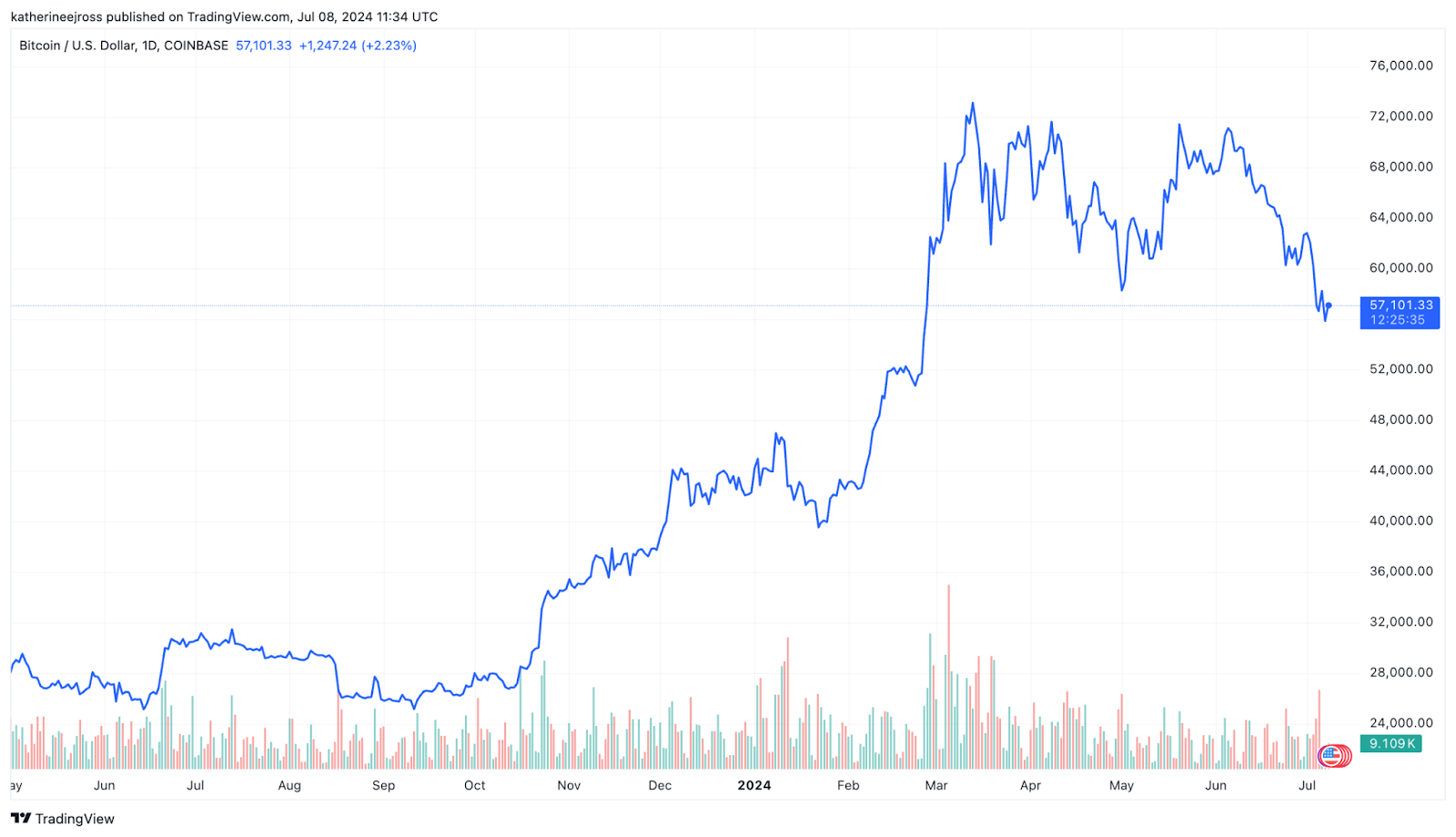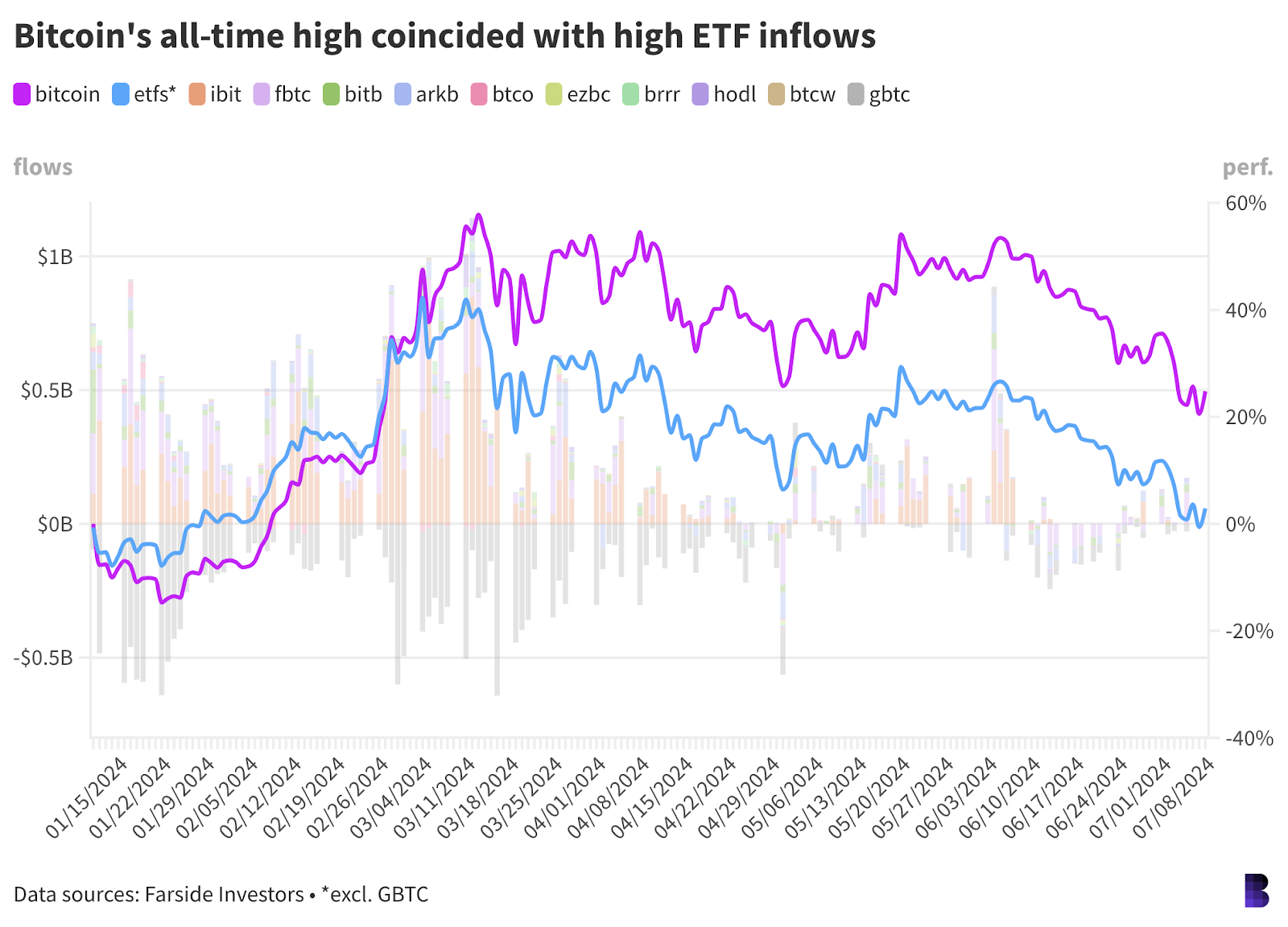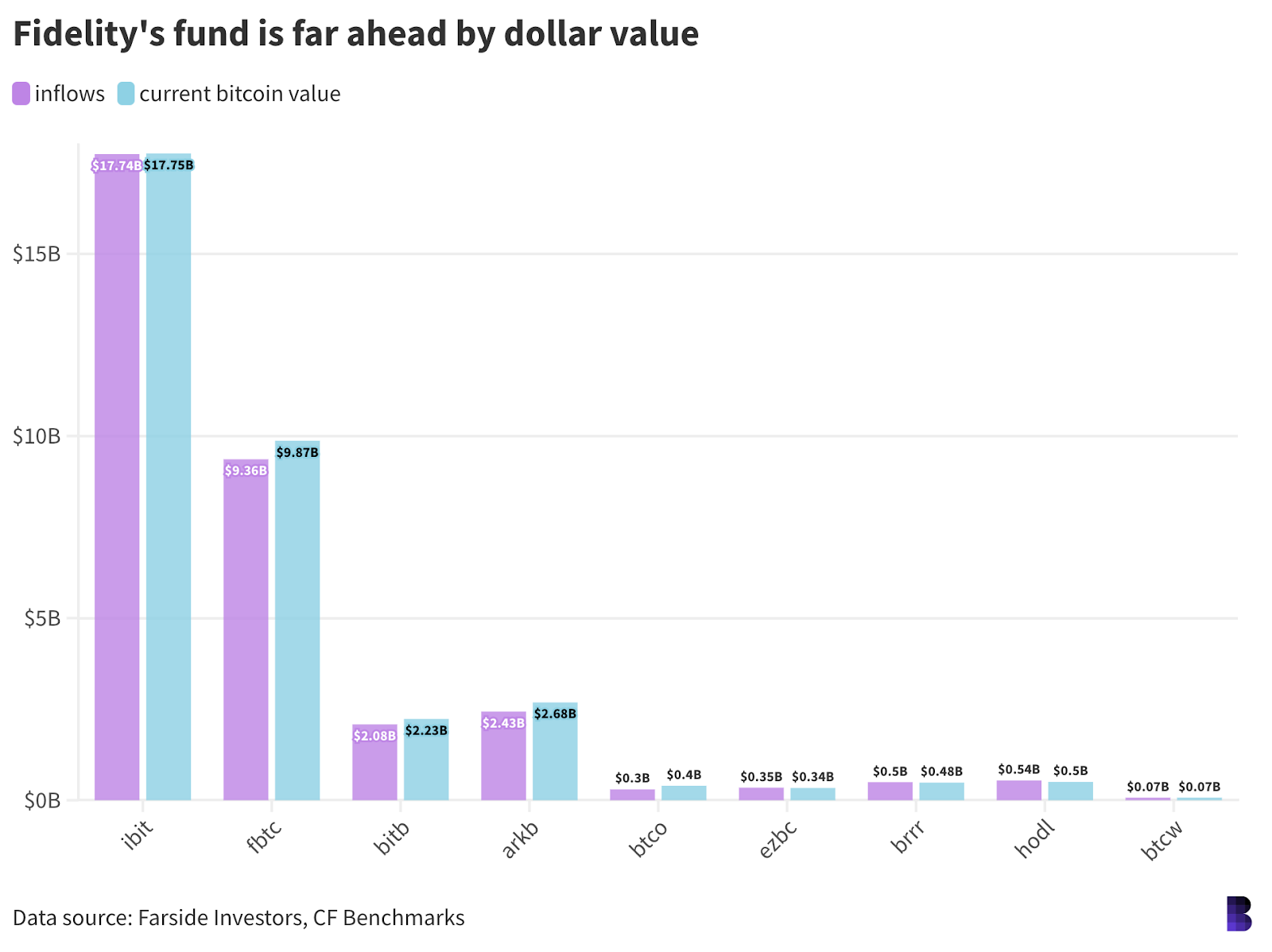Today, enjoy the Empire newsletter on Blockworks.co. Tomorrow, get the news delivered directly to your inbox. Subscribe to the Empire newsletter.
Just the Sunday Scaries?
Unlike most of the American crowd, the volatility in bitcoin didn’t take a breather to celebrate the holiday weekend. On Sunday, bitcoin hit $54,000 before bouncing back overnight. It’s currently trading around $57,000.
Memecoins weren’t spared in the selloff, and certain tokens — like dogwifhat — are still leading the top 100 losers per CoinGecko data.
Is this all super surprising? Not really. Traders have summed the action up to Mt. Gox repayments coupled with selling pressure from the German government, which continues to offload bits and pieces of its $2 billion bitcoin stash. And then we have to note that we’re still in the throes of summer…
“The high on-chain selling pressure may be attributed to the commencement of Mt.Gox repayments, which have been awaited by investors for years. Although investors might wait up to 90 days to access the funds, the official news of repayments, confirmed by the verified movement of 47,228 BTC from a Mt.Gox-associated cold wallet to a new address likely designated for repayments, triggered market reactions,” Matteo Greco, a research analyst at Fineqia, wrote in a note this morning.
If you need some optimism this fine Monday morning, then I’ll point you to the year-to-date chart for bitcoin, which also showcases the buying we saw after it dipped late Sunday.

A few weeks ago, I talked to Ledn’s John Glover about his technical outlook for bitcoin. He gave two levels to watch: Between $55,000 and $56,000 and $49,000. Keep these numbers in mind as the summer continues.
“Timing crypto markets in the near term I believe is tricky but this is probably the most challenging environment I’ve seen especially since equities are ripping, rates are high but crypto is chopping with pronounced [volume],” Empire podcast host Santiago Santos posted on X.
CoinShares thinks that the weakness presented some investors with a buying opportunity — in ETFs that is. Analyst James Butterfill noted that crypto investment products saw $441 million worth of inflows last week.
“Regionally, the inflows were primarily the US, which saw US$384 [million], although opportunistic buying was seen across a broad set of countries, most notable were Hong Kong, Switzerland and Canada, seeing US$32m, US$24m and US$12m respectively. Germany being an outlier, seeing US$23m outflows,” Butterfill wrote.
Greco noted that this is the first time that a market decline hasn’t correlated with ETF flows.
“Historically, bitcoin spot ETFs have significantly influenced market activity and price action, with a strong correlation between ETF flows and price movements. However, for the first time since their inception, there is a noticeable decoupling between price action and capital flows, indicating that recent price behavior has been driven mainly by trading activity within the crypto-native space,” he wrote.
But volume for the products is down, which — again — isn’t a surprise when looking at seasonal trends. The third quarter generally has the “lowest trading activity.”
“This data should not be seen negatively but rather as a seasonal trend, especially among traditional finance investors,” Greco noted. Total volumes for ETPs, per CoinShares, came in at $7.9 billion.
Keep that seat belt buckled, folks, and expect the volatility to continue as we get through the dog days of summer.
— Katherine Ross
Data Center
- USDT supply is down $700 million in the past week, according to The Tie data, the largest reduction since August 2023.
- TIA and STRK are rebounding the hardest, up 14% and 9%, respectively, although both have significantly underperformed this year.
- TVL in DeFi is down almost 10% in July, to $86.77 billion, its lowest point since mid-April, per DeFiLlama.
- Daily bitcoin fees were just $712,353 on Sunday — the least amount paid since Halloween, according to CoinMetrics data.
- Weekly active addresses on Blast have nearly halved since last month’s airdrop, down to 313,400 from around 578,000.
Trauma bonding
Bitcoin has us all glued to the charts right now.
Few likely more so than this year’s freshman class of bitcoin ETF shareholders, the first ever.
BTC is now more than 20% below its record set in March, which, going by the TradFi narrative, would mean it’s now entered a bear market.
Those old rules don’t really apply to crypto. Bitcoin, ether and practically all other cryptocurrencies regularly see swings of that scale, also during bull markets, even if they’re becoming less common.
All of this puts buyers of the new spot bitcoin ETFs in an awkward spot. The funds debuted in early January — when bitcoin traded around $44,000 — three months before its current all-time high of nearly $73,400. Bitcoin was changing hands for about $57,800 earlier this morning.
The share price of each ETF closely tracks the price of bitcoin. But are the funds themselves still up on the bitcoin they’ve bought for their shareholders to date?
Luckily, comparing daily flow data with bitcoin prices gives a decent estimate of how much bitcoin each fund bought per day.

(As of Friday, the US bitcoin ETFs have altogether added $14.76 billion bitcoin to their treasuries since their launch. But for the sake of this analysis, we’ll remove GBTC from the calculation, which leaves the nine new ETFs with $33.37 billion net flows to date.)
The purple line on the chart above shows bitcoin’s price performance while the blue line represents the value of spot ETFs bitcoin treasuries over their cumulative net flows. Above zero means the bitcoin held by the ETFs is now worth more than what they roughly paid for it.
Daily flows are the columns in the background. Notice they far outstripped GBTC outflows around bitcoin’s all-time high but dropped off significantly as bitcoin’s price retraced, which means few bought the dip to $58,200 in early May.
By percentage value increase, Invesco-Galaxy’s BTCO’s bitcoin is still the furthest ahead by far, up 33% on its net flows to date. Bitcoin has gained only 23% across the same period.
Most of BTCO’s inflows came in when bitcoin was low in January while some shareholders cashed out on the way up to record highs (buying low and selling high as a cohort).

BlackRock’s IBIT is only marginally ahead — just 0.09% — based on a price of $57,822, the equivalent of $15.5 million on net flows of $17.74 billion.
Fidelity’s FBTC is the best by dollar value, up nearly 5.5% on $9.36 billion. Paper profits of around $509 million.
For anyone holding bitcoin, ETFs or any other form of crypto exposure, the big question right now is whether bitcoin has “double-topped,” a bearish pattern involving two price peaks of around the same level.
Double tops happen when significant selling resistance is met, with buyers unable to break through the wall on two largely separate attempts.
Bitcoin does look like it’s forming two peaks, however, there are rather strict rules about what constitutes a double top, particularly around the size of the corrections.
Popular trader Peter Brandt seemed to suggest on X overnight that bitcoin’s price hadn’t yet ticked those boxes. Which would be good news for ETF buyers — and everyone else.
— David Canellis
The Works
- Jeffries analysts noted that bitcoin mining profitability rose in June and the network hash rate dropped by 5%.
- North Carolina Governor Roy Cooper vetoed an anti-CBDC bill that was passed in both houses.
- Samourai Wallet co-founder William Lonergan Hill was released on bail, The Block reported.
- Multicoin pledged $1 million to support pro-crypto Senate candidates.
- Japan’s Metaplanet bought more bitcoin, the company announced.
The Riff
Q: Is crypto prepared for extreme volatility?
If it seems like bitcoin goes up or down on a whiff of bad or good news — you’re right. Always has been.
There will forever be companies, protocols, funds, DAOs and foundations that fumble the ball when prices go ballistic one way or the other. Others will manage to capitalize.
Prices quickly falling in odd corners of DeFi cause all sorts of high-pressure situations, like the one that hit Curve last month over millions in bad debt.
Some situations will undoubtedly call for crisis management from project founders, contributors and other market participants.
But crypto itself — as in the underlying plumbing — will probably be fine, especially the more decentralized parts of the market. It just might take some firefighting.
— David Canellis
I would hope so.
In all seriousness though, I think it is. Volatility can make price action look scary, but if there’s one thing I’ve learned it’s that technical analysis is your friend if you’re an anxious human being (aka me).
Crypto is pretty good at taking volatility in stride, though it obviously hurts when extreme situations happen. The key, for investors especially, is to not get overwhelmed by the panic.
As David noted, some sectors of the overall market may be weaker than others, but overall crypto is in a really good position right now.
We survived the collapse of TerraUSD and the days of doom and gloom after FTX. The market’s prepared to batten down the hatches and ride out a so-called storm if need be, but we’re nowhere near that case right now.
Keep calm and carry on, crypto can weather some volatility.
— Katherine Ross
 blockworks.co
blockworks.co
